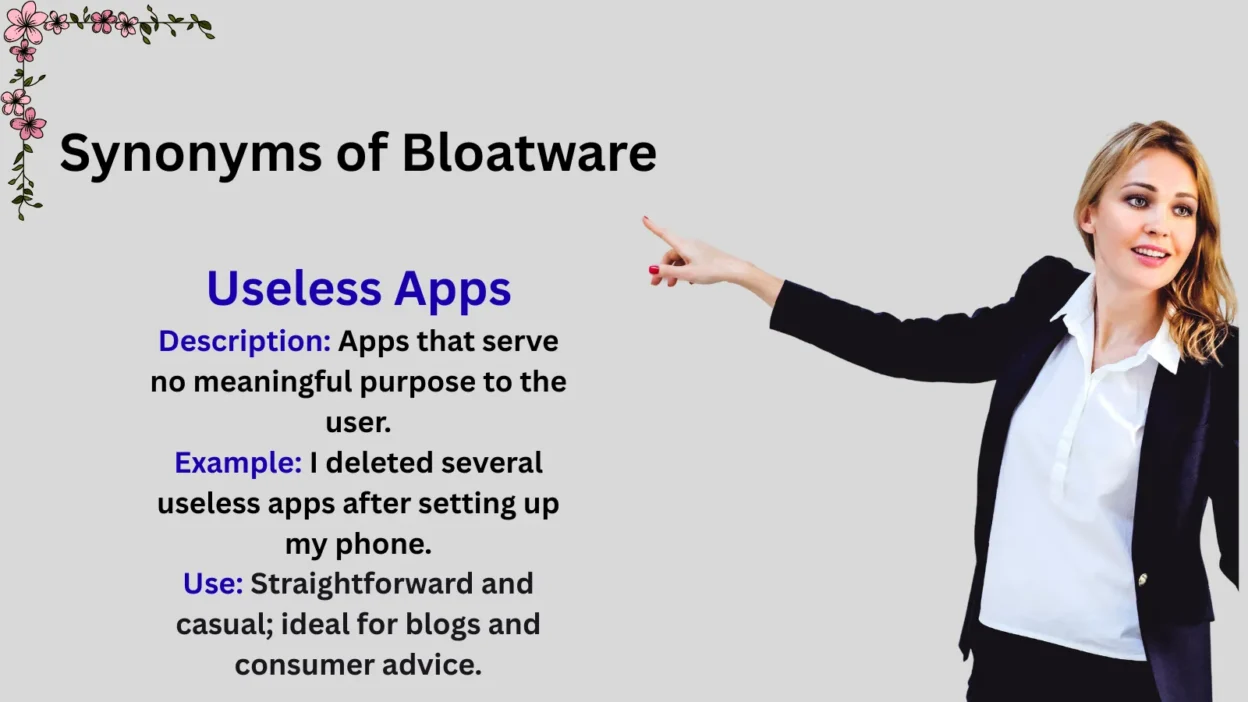Synonyms of bloatware, such as junkware, pre-installed apps, and unnecessary software, describe programs that take up space and slow down devices without offering much value. For example, “junkware” highlights useless or unwanted programs, while “pre-installed apps” focus on software that comes by default on new devices.
If you’re writing about tech, cybersecurity, or device performance, choosing the right synonym helps set the perfect tone and adds clarity for your readers. From casual users to tech experts, everyone deals with bloatware at some point—and knowing the right terms makes it easier to talk about.
These synonyms of bloatware not only improve your writing but also help readers understand how excess software impacts speed, storage, and efficiency.
What Does Bloatware Mean?
Bloatware refers to unwanted or unnecessary software that comes pre-installed on a device or is added later, taking up storage and slowing performance. It’s often:
- Pre-loaded by manufacturers
- Hard to delete or disable
- Resource-heavy and intrusive
- Annoying but usually harmless
It’s not just extra software—it’s digital clutter. Bloatware shows how too many apps can make even the best devices feel slow and crowded.
Synonyms & Related Words for Bloatware (And When to Use Them)
1. Crapware
Meaning: Informal, derogatory term for useless pre-installed software.
Example: “I had to uninstall all the crapware before my laptop would run smoothly.”
Usage Tip: Casual conversations, tech forums, or when emphasizing frustration.
2. Junkware
Meaning: Software considered unnecessary or low-quality.
Example: “This phone came with so much junkware; it slowed everything down.”
Usage Tip: Similar to crapware, slightly less harsh; good for consumer-focused writing.
3. Pre-installed Apps
Meaning: Neutral term for software that comes already on a device.
Example: “Many users dislike the pre-installed apps that can’t be removed.”
Usage Tip: Neutral, suitable for formal writing or articles.
4. Unwanted Software
Meaning: Software that users do not want or need.
Example: “Unwanted software can clutter your desktop and affect performance.”
Usage Tip: Polite and professional; suitable for guides or technical writing.
5. System Add-ons
Meaning: Additional software bundled with a system.
Example: “Some system add-ons are useful, but others act as bloatware.”
Usage Tip: Professional or semi-technical writing; slightly less critical.
6. Resource-Hogging Software
Meaning: Software that consumes excessive memory or CPU.
Example: “Resource-hogging software made my old PC nearly unusable.”
Usage Tip: Emphasizes performance issues rather than uselessness.
7. Bloated Software
Meaning: General term for software with unnecessary features.
Example: “The new update feels like bloated software, with tools I’ll never use.”
Usage Tip: Neutral to slightly negative; good for professional reviews.
8. Useless Apps
Meaning: Apps that serve no meaningful purpose to the user.
Example: “I deleted several useless apps after setting up my phone.”
Usage Tip: Straightforward and casual; ideal for blogs and consumer advice.
9. Unnecessary Software
Meaning: Software that isn’t essential for core device functions.
Example: “Unnecessary software can slow down startup times.”
Usage Tip: Neutral; works well in tutorials or guides.
10. Excess Software
Meaning: Software that exceeds what is needed.
Example: “The system update added excess software that I didn’t ask for.”
Usage Tip: Slightly formal; emphasizes overabundance.
11. Balloonware
Meaning: Informal, creative synonym emphasizing “inflation” of features.
Example: “This OS update is full of balloonware that nobody uses.”
Usage Tip: Quirky, humorous tone; tech blogs or opinion pieces.
12. Fatware
Meaning: Emphasizes software’s large size or “heaviness.”
Example: “I had to remove the fatware to free up storage.”
Usage Tip: Informal, playful; tech enthusiasts may appreciate this term.
13. Clutterware
Meaning: Software that clutters the system unnecessarily.
Example: “Clutterware made finding essential apps a hassle.”
Usage Tip: Neutral to mildly critical; emphasizes visual and functional clutter.
14. Overloaded Apps
Meaning: Apps with too many features or options.
Example: “Overloaded apps slow down the phone and confuse users.”
Usage Tip: Focuses on feature bloat rather than uselessness.
15. Nonessential Software
Meaning: Software that isn’t required for the system to function.
Example: “Removing nonessential software improved my laptop’s speed.”
Usage Tip: Professional and neutral; great for guides or reviews.
16. Unneeded Programs
Meaning: Another neutral term highlighting the lack of necessity.
Example: “Many unneeded programs come pre-installed on Windows PCs.”
Usage Tip: Clear, professional, and easy to understand.
17. Preloaded Software
Meaning: Software that comes preloaded on a device.
Example: “Some preloaded software is genuinely useful, but some is just bloatware.”
Usage Tip: Neutral; standard in reviews or tech writing.
18. Excessive Software
Meaning: Software that exceeds the essential or desired amount.
Example: “Excessive software can overwhelm new users.”
Usage Tip: Slightly formal; suitable for educational or technical writing.
19. Redundant Software
Meaning: Software duplicating functions already available elsewhere.
Example: “The OS installed redundant software that I already had.”
Usage Tip: Focuses on duplication; good for technical analysis.
20. Overstuffed Apps
Meaning: Apps loaded with too many features.
Example: “Overstuffed apps take longer to load and confuse users.”
Usage Tip: Informal, descriptive; emphasizes performance issues.
21. Frivolous Apps
Meaning: Apps that are unnecessary or trivial.
Example: “Frivolous apps drain battery and distract users.”
Usage Tip: Slightly witty or critical; consumer advice or blogs.
22. Heavyweight Software
Meaning: Software that uses significant system resources.
Example: “Heavyweight software slows down older computers.”
Usage Tip: Neutral to mildly negative; emphasizes size and load.
23. Bulky Programs
Meaning: Programs that feel large and cumbersome.
Example: “Bulky programs can frustrate users who value speed.”
Usage Tip: Neutral, slightly informal; descriptive term.
24. Padding Software
Meaning: Software that “pads” the device with unnecessary features.
Example: “Padding software takes up storage without offering benefits.”
Usage Tip: Creative, slightly critical; tech blogs.
25. Superfluous Apps
Meaning: Apps that are beyond what is necessary.
Example: “Superfluous apps clutter the home screen and waste space.”
Usage Tip: Formal or semi-formal; excellent for professional writing.
26. Junk Programs
Meaning: Low-quality or unwanted programs.
Example: “I spent an hour removing junk programs from my new PC.”
Usage Tip: Casual; emphasizes annoyance and low value.
27. Excessive Add-ons
Meaning: Add-ons that go beyond what’s needed.
Example: “The browser came with excessive add-ons pre-installed.”
Usage Tip: Neutral to mildly critical; emphasizes overabundance.
28. Nonfunctional Apps
Meaning: Apps that don’t perform any useful function.
Example: “Some nonfunctional apps are purely for marketing purposes.”
Usage Tip: Objective; highlights software uselessness without sarcasm.
29. Inflated Software
Meaning: Software that is “inflated” with unnecessary features.
Example: “The new update feels like inflated software, with features I’ll never touch.”
Usage Tip: Professional or semi-formal; emphasizes unnecessary expansion.
30. Redundant Apps
Meaning: Apps repeat functions already present in the system.
Example: “I removed several redundant apps to declutter my device.”
Usage Tip: Neutral; great for formal reviews or guides.
How to Choose the Right Synonym
Selecting the right synonym for bloatware depends on tone, audience, and context:
- Casual or conversational tone: Use terms like crapware, junkware, or useless apps. They convey frustration and are relatable to general audiences.
- Neutral or professional tone: Opt for pre-installed software, nonessential software, or unwanted software. Perfect for guides, reviews, or technical writing.
- Humorous or playful tone: Terms like balloonware, fatware, or padding software add color and personality to your writing.
- Performance-focused context: Words like resource-hogging software, heavyweight software, or bloated software emphasize system impact rather than uselessness.
- Formal or analytical context: Use redundant software, superfluous apps, or excessive software for precision and clarity.
Cultural or emotional considerations: Some terms (like crapware) may be seen as slangy or too casual for professional writing, while others (redundant software) may appear too clinical for casual readers. Always match your synonym to the audience’s expectations and the tone of your content.
Conclusion
Synonyms of bloatware help clarify the many ways people describe software that is heavy, unnecessary, or slows down devices. Terms like unwanted programs, junk software, crapware, and bloated apps highlight different aspects of this common tech problem.
Understanding these alternatives not only expands your vocabulary but also allows you to communicate more precisely about technology — whether you’re writing reviews, troubleshooting, or discussing devices with others.
By knowing the right words, you can describe software issues clearly and effectively in both professional and casual contexts.



